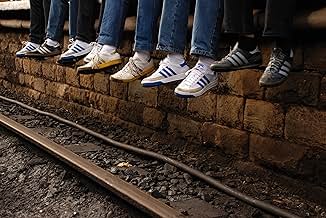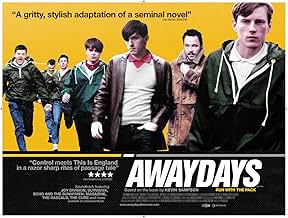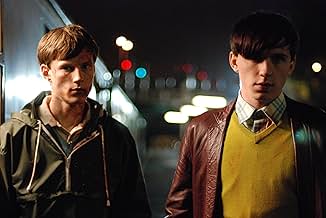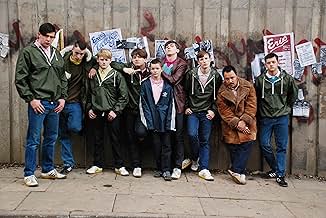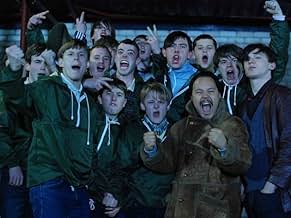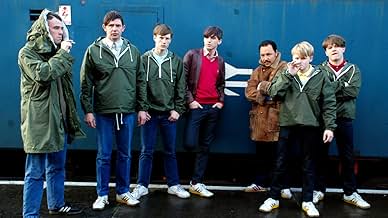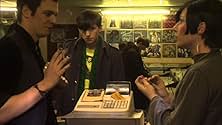CALIFICACIÓN DE IMDb
5.7/10
3.9 k
TU CALIFICACIÓN
Agrega una trama en tu idiomaIn the grim early years of Margaret Thatcher's premiership, also the crown years of hooliganism, the opportunities for thrill-seeking young men are what they've always been: sex, drugs, rock... Leer todoIn the grim early years of Margaret Thatcher's premiership, also the crown years of hooliganism, the opportunities for thrill-seeking young men are what they've always been: sex, drugs, rock n' roll, fashion, football and fighting.In the grim early years of Margaret Thatcher's premiership, also the crown years of hooliganism, the opportunities for thrill-seeking young men are what they've always been: sex, drugs, rock n' roll, fashion, football and fighting.
- Premios
- 1 premio ganado en total
Michael Ryan
- Marty
- (as Micheal Ryan)
Anthony Borrows
- Pee Wee
- (as Anthony Burrows)
Holliday Grainger
- Molly
- (as Holliday Granger)
Lianne Sorsa
- Suzy
- (as Lianna Sorza)
Dannielle Malone
- Janie
- (as Danielle Malone)
Opiniones destacadas
'Awaydays' is not your typical football hooligan film, the sub-culture of football hooliganism in the early years of Thatcher's Britain is there to set the brooding scene, however it is evocative the homo-erotic relationship between Carty (Nicky Bell) and the eccentric Elvis (Liam Boyle) that takes centre stage and gives Paul Holden's film slightly more depth than simply being a film about men taking out their boredom in the form of fighting on a Saturday afternoon.
Paul Carty is a suburban male who is drawn towards the 'The Pack', a group of thugs who take their excitement from fighting on a Saturday afternoon all across Britain, through these encounters he grows closer and closer with a bohemian working-class character in Elvis. Elvis just wants to move away to Berlin and start a new life around people who understand him, while Carty just wants to find direction in his life after his mother's death. As they connect through their mutual love of Bowie, the Liverpudlian music scene and Art, they develop an increasingly complex relationship that is bordering on the homoerotic. It is this intricate bond between these two seemingly different, yet very similar and flawed 'men' that keeps the film ticking over. If you removed this key component then the film falls a little flat, with Kevin Sampson's script missing out many explanations to key elements such as why Carty is drawn towards the allure of the 'The Pack' in the first place and the death of John. With that said, it is hauntingly shot with a soundtrack that compliments Pat Holden's sombre directorial style, and even though at times he has a tendency to delve too much into the LSD-induced hallucinogenic state's of both boys minds, he does it with little expense to the viewer.
If you want a film that doesn't simply look at the male phenomenon of having a good scrap on a Saturday afternoon because we're all bored and working class zombies in a capitalist machine ('Football Factory', 'Green Street') then 'Awaydays' is for you, as it offers just that bit more and is akin to something of a 'football-love-story'.
Paul Carty is a suburban male who is drawn towards the 'The Pack', a group of thugs who take their excitement from fighting on a Saturday afternoon all across Britain, through these encounters he grows closer and closer with a bohemian working-class character in Elvis. Elvis just wants to move away to Berlin and start a new life around people who understand him, while Carty just wants to find direction in his life after his mother's death. As they connect through their mutual love of Bowie, the Liverpudlian music scene and Art, they develop an increasingly complex relationship that is bordering on the homoerotic. It is this intricate bond between these two seemingly different, yet very similar and flawed 'men' that keeps the film ticking over. If you removed this key component then the film falls a little flat, with Kevin Sampson's script missing out many explanations to key elements such as why Carty is drawn towards the allure of the 'The Pack' in the first place and the death of John. With that said, it is hauntingly shot with a soundtrack that compliments Pat Holden's sombre directorial style, and even though at times he has a tendency to delve too much into the LSD-induced hallucinogenic state's of both boys minds, he does it with little expense to the viewer.
If you want a film that doesn't simply look at the male phenomenon of having a good scrap on a Saturday afternoon because we're all bored and working class zombies in a capitalist machine ('Football Factory', 'Green Street') then 'Awaydays' is for you, as it offers just that bit more and is akin to something of a 'football-love-story'.
There seems to be some ill-will towards this tidy little parable and I cannot understand why.
Maybe the Joy Division fanboys feel the material is misplaced but I contend the great soundtrack is only used to set time and place and does not work in reverse like some latter day music vid.
Nor is it a 'hooligan' movie.
My own reaction was that this is a terrific effort, both from a committed cast and production side who nail the period in perfect British bleakness.
The football hooliganism feels like it is intended - a fantastical sideshow and not the main thrust of the film which centres around a lower middle-class lad's attempt for acceptance by a pack of working-class hooligans and the unrequited homosexual love between him and the pack's coolest member.
Carty, said middle-class lad, ultimately is a tourist, and the film conveys this superbly while whipping us along for the ride.
Pay little attention to those attempting to fold this boisterous creation into a pigeon hole; it stands on its own as a potent reflection of a sentimentally grim time in British culture.
Entertaining, admirable and bittersweet. Watch it.
Maybe the Joy Division fanboys feel the material is misplaced but I contend the great soundtrack is only used to set time and place and does not work in reverse like some latter day music vid.
Nor is it a 'hooligan' movie.
My own reaction was that this is a terrific effort, both from a committed cast and production side who nail the period in perfect British bleakness.
The football hooliganism feels like it is intended - a fantastical sideshow and not the main thrust of the film which centres around a lower middle-class lad's attempt for acceptance by a pack of working-class hooligans and the unrequited homosexual love between him and the pack's coolest member.
Carty, said middle-class lad, ultimately is a tourist, and the film conveys this superbly while whipping us along for the ride.
Pay little attention to those attempting to fold this boisterous creation into a pigeon hole; it stands on its own as a potent reflection of a sentimentally grim time in British culture.
Entertaining, admirable and bittersweet. Watch it.
Having read Kevin Sampson's thoughtful novel the screen version is something of a disappointment. Characterisation and motivation are largely over-looked in favour of scenes of adrenaline-charged violence. The clothing and style of the era are meticulously created for "The pack" (the hooligan group that Carty joins) but you have to question why the people they fight are generally older less fashionably dressed groups. The pack also emerge from every fight with barely an injury. The music itself is good but often misused - is Joy Division's delicately mournful "The Eternal" really an appropriate soundtrack to a group of bovver boys snarling their way down the street? Shane Meadows "This is England" offers a far superior vision of the period.
This is has got to be one of the most bizarre movies I've seen in a very long time . It has the gloomy , gritty , realist kitchen sink drama you've seen a million times from every Ken Loach film . Somewhat conscious of this Pat Holden then introduces a contemporary soundtrack tothe film , a soundtrack that seems to go on and on . According to the wikipedia a grand total of 28 tracks are used throughout the running time . You can't get enough of doom laden nihilistic songs , tunes to slash your wrists to ? Then you'll probably enjoy AWAYDAYS . Oh and you're also a latent homosexual who can't catch enough homo erotic glances from male characters in a movie ? In that case you might just believe this is a gay , kitchen sink , pop video equivalent of GONE WITH THE WIND
These aren't necessarily criticisms and AWAYDAYS would go down very well with film students wanting to discuss kitchen sink British drama or gay cinema or wider existentialist themes . Certainly the look and feel of the movie resembles that of many classic PLAY FOR TODAY dramas but the problem is there seems to be three different type of films trying to escape
Certainly the best aspect of the film is its sense of time and place . Unlike Nick Love's remake of THE FIRM you really do believe the story is taking place in its chronological setting , so much so that Holden gives the impression that he owns a Tardis . The hairstyles and fashion and whole feel of the movie screams that it's 1979 Merseyside . However this is the only thing Holden manages to capture well and convey to the audience
It's interesting how extreme some of the reviews on this page are and after watching AWAYDAYS you'll take on board both the praise and criticism . Both sides are right in their arguments and I'm sticking by my one line summary at the top of this review
These aren't necessarily criticisms and AWAYDAYS would go down very well with film students wanting to discuss kitchen sink British drama or gay cinema or wider existentialist themes . Certainly the look and feel of the movie resembles that of many classic PLAY FOR TODAY dramas but the problem is there seems to be three different type of films trying to escape
Certainly the best aspect of the film is its sense of time and place . Unlike Nick Love's remake of THE FIRM you really do believe the story is taking place in its chronological setting , so much so that Holden gives the impression that he owns a Tardis . The hairstyles and fashion and whole feel of the movie screams that it's 1979 Merseyside . However this is the only thing Holden manages to capture well and convey to the audience
It's interesting how extreme some of the reviews on this page are and after watching AWAYDAYS you'll take on board both the praise and criticism . Both sides are right in their arguments and I'm sticking by my one line summary at the top of this review
STAR RATING: ***** Saturday Night **** Friday Night *** Friday Morning ** Sunday Night * Monday Morning
After the death of his mother, Paul (Nicky Bell) is looking for some direction in his life and thinks he's found it with 'the pack', a gang of football hooligans in late '70s Merseyside with a distinctive dress sense and tribal mentality. However, an encounter with former top boy Elvis (Liam Boyle) gives him an alternate view of them and the possibility of moving his life in a more positive direction. Elvis's dream is to escape to Berlin and lead a more fulfilling life and this is a direction Paul sees...but circumstances beyond his control drag him down with those around him and see his life thrown into chaos.
As morally dubious as they are, 'hooligan' films certainly have their own cult following in the UK, although this dramatization of a late 70s Merseyside gang has received limited exposure. It's an admirable piece, without any funding from any of the big London studios (ah), and it's not translated particularly badly into a film. But that doesn't mean it works.
The performances from the two lead actors are fine, as well as supporting actors such as man of the moment Stephen Graham in a smaller role, but who manages to have presence even with this. And it's an engaging piece of human drama, that manages to sweep you along with enough substance and depth to keep you hooked. But it's all lost on some weird art-house trip with itself, with slow, lingering close up shots of Boyle's bare chest and symbolism with red paint flowing between fingers representing blood, all done to a haunting Joy Division soundtrack. While it's stuck in this rut, the story becomes less engaging, the characters lose their depth and the film generally becomes a bit of a mess. Hardly a failure, but still a bit of a shame. **
After the death of his mother, Paul (Nicky Bell) is looking for some direction in his life and thinks he's found it with 'the pack', a gang of football hooligans in late '70s Merseyside with a distinctive dress sense and tribal mentality. However, an encounter with former top boy Elvis (Liam Boyle) gives him an alternate view of them and the possibility of moving his life in a more positive direction. Elvis's dream is to escape to Berlin and lead a more fulfilling life and this is a direction Paul sees...but circumstances beyond his control drag him down with those around him and see his life thrown into chaos.
As morally dubious as they are, 'hooligan' films certainly have their own cult following in the UK, although this dramatization of a late 70s Merseyside gang has received limited exposure. It's an admirable piece, without any funding from any of the big London studios (ah), and it's not translated particularly badly into a film. But that doesn't mean it works.
The performances from the two lead actors are fine, as well as supporting actors such as man of the moment Stephen Graham in a smaller role, but who manages to have presence even with this. And it's an engaging piece of human drama, that manages to sweep you along with enough substance and depth to keep you hooked. But it's all lost on some weird art-house trip with itself, with slow, lingering close up shots of Boyle's bare chest and symbolism with red paint flowing between fingers representing blood, all done to a haunting Joy Division soundtrack. While it's stuck in this rut, the story becomes less engaging, the characters lose their depth and the film generally becomes a bit of a mess. Hardly a failure, but still a bit of a shame. **
¿Sabías que…?
- TriviaDuring one scene, Elvis talks about the idea of hanging himself whilst listening to "New Dawn Fades" by Joy Division. In 1980, Ian Curtis, the lead singer of Joy Division actually commited suicide the same way.
- ErroresThe "scouse" accents of nearly all the characters are clearly fake.
- Créditos curiososThe credits thank "Nicola & Eddy at Camel Llairds". The correct spelling of this famous shipbuilder is "Cammell Laird"
- Bandas sonorasNag Nag Nag
Written by Richard H. Kirk, Stephen Mallinder and Chris Watson
Performed by Cabaret Voltaire, bass & vocals Stephen Mallinder
Courtesy of Rough Trade Records
Selecciones populares
Inicia sesión para calificar y agrega a la lista de videos para obtener recomendaciones personalizadas
- How long is Awaydays?Con tecnología de Alexa
Detalles
Taquilla
- Total a nivel mundial
- USD 131,265
- Tiempo de ejecución1 hora 45 minutos
- Color
Contribuir a esta página
Sugiere una edición o agrega el contenido que falta

Principales brechas de datos
By what name was Awaydays (2009) officially released in India in English?
Responda

